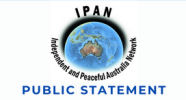 Following Russia’s intervention to help the Syrian army on Wednesday 30 September, there was a report on the World Today by Barney Porter (who also produces the program). It left an awful lot to be desired, not all of which could be blamed on Porter and his choice of interviewees. He only allowed Kerry to describe his own delusion that ‘Assad only controls 25% of the country’ – ( so Russia is backing a loser..). But of course the whole tone of the report was anti-Russian and Anti-Putin.
Following Russia’s intervention to help the Syrian army on Wednesday 30 September, there was a report on the World Today by Barney Porter (who also produces the program). It left an awful lot to be desired, not all of which could be blamed on Porter and his choice of interviewees. He only allowed Kerry to describe his own delusion that ‘Assad only controls 25% of the country’ – ( so Russia is backing a loser..). But of course the whole tone of the report was anti-Russian and Anti-Putin.
 Today October 2, 2015, there was another report from Barney on the World Today, which wasn’t a huge lot different. I have noticed in the past that he often speaks to half a dozen people – but of course they still all sit on the same side of the fence. There continues to be a stunning lack of different viewpoints in the Western media sphere, think-tanks and commentators.
Today October 2, 2015, there was another report from Barney on the World Today, which wasn’t a huge lot different. I have noticed in the past that he often speaks to half a dozen people – but of course they still all sit on the same side of the fence. There continues to be a stunning lack of different viewpoints in the Western media sphere, think-tanks and commentators.
Porter’s report was followed by an interview by ELizabeth Jackson, who is quite hopelessly biased against Assad. She was speaking to Peter Jennings from the Australian Strategic Policy Institute (APSI). It is significant that this man (a) was from the dept of Defence, and (b) was appointed to APSI – an ‘independent’ government funded think-tank set up by Stephen Smith in 2012, with Hugh White as director.
So Peter Jennings effectively suggests or promotes government policy.
You can read the interview below, with the worst bits highlighted. You might also read what was an article in the Weekend Australian on September 12th, just after our ‘declaration of war on Syria’. See https://www.aspi.org.au/publications/opinion-pieces/destruction-of-islamic-state-is-the-first-step-on-the-road-to-middle-east-solution/Destruction-of-Islamic-State-is-the-first-step-on-the-road-to-Middle-East-solution.pdf
In this article, Jenning’s proposals, for cruise missile strikes on Syrian air force bases – ‘the Russians mightn’t like’.. and replacement of Assad with ‘another Alawite general’ in the meantime, followed by a ‘Sunni from the refugee camps’, are almost beyond belief.
I also noticed in the interview today that Jennings referred to ‘Bashir al Assad’, and to Tarsus, not Tartus ( both corrected in the transcript).
Clearly the man doesn’t have the slightest idea about Syria, or Russia, and what he advises seems based on bigotry and a fossilised idea about the region.
But it’s also an indication of the problem for the ABC for instance, if it thinks to present a reasonable alternative point of view.
Porter also interviewed the hawkish Kilcullen briefly today, who oddly allowed some truth to slip through the orchestrated propaganda. Kilcullen admitted something about Al Nusra and ISIS being around Homs in Syria. In this he contradicted the falsity of what the west has been maintaining. The West has been pretending that ISIS isn't prevalent in the area where Russia has dropped bombs, and, on the basis of this fiction, has accused Russia of actually dropping bombs on the spuriously designate 'moderate opposition'.
http://www.abc.net.au/worldtoday/content/2015/s4323150.htm
ABC Australia World Today, Thursday, October 1, 2015 12:20:00
ELIZABETH JACKSON: Peter Jennings is the executive director of the Australian Strategic Policy Institute.
He says Russia's actions demonstrate that its loyalty to Bashar al-Assad is stronger than its desire to defeat IS.
PETER JENNINGS: I think everyone needs to be looked at pretty sceptically when it comes to Syria. I certainly don't believe the Russians because their only interest is really in propping up Bashar al-Assad, and the Americans I think are scrambling to cover for really three or four years of completely ignoring the crisis and they're coming to this rather late and in a weak position.
ELIZABETH JACKSON: So you are of the view then that Russia has deliberately bombed rebels not IS fighters. Is that correct?
PETER JENNINGS: That seems to be the effect of the reporting. It's happening in the city of Homs where IS has not actually been present. This is all about shoring up their client’s position, but you know, one has to wonder if the Russians haven't in some ways made a really big strategic mistake.
Because I don't see Assad being able to claw himself back from what is a continually weakening position, and the Russians need to be careful that they don't find themselves actually becoming the brunt of the jihadist's campaign.
ELIZABETH JACKSON: So the Russians now appear to be trying to justify their actions using very diplomatic language, saying we agree about the goal, we just have different ideas about the methods of achieving that goal. What do you make of all of that?
PETER JENNINGS: Well, we've seen what their methods are, which is frankly indiscriminate bombing, and then after the Russian strikes, in flew the Syrian helicopters to drop more barrel bombs. This is, as we've seen with Vladimir Putin's behaviour in Ukraine, it's deeply cynical.
It's covered in the language of principle, but it's clearly not that, and it is only about shoring up Russia's increasingly weak looking client in the form of Bashar al-Assad.
ELIZABETH JACKSON: Is there any significance, do you think to the fact that the Russians only gave the Americans an hour's notice that they were going to start bombing?
PETER JENNINGS: Well, the Russians are in a position to do this, because they have the forces in the country and have had for decades, although they've recently reinforced them.
The Americans are really in no position to do anything other than watch what's going on, so you know, there is very clearly a sort of tactical advantage that the Russians have, and I guess the hour's notice to the Americans is just to make sure that when their aircraft are in the air, they're not going to be targeted by the Americans in any way, which neither side would have an interest in wanting to do.
So really, Washington can only sit back with some frustration, I imagine, at this moment to actually watch what the Russians are about.
ELIZABETH JACKSON: Do you consider this to be a risky strategy on the part of Russia?
PETER JENNINGS: Highly risky, highly. I mean I think there are two elements to this: one is there are significant number of Chechens, several hundred possibly already fighting for IS, so by going in more actively and targeting Sunni extremist groups, the Russians risk terrorism coming back into their own country through enraging their own Chechen population.
And secondly, in the Middle East themselves, they're now going to be making themselves a principle target of IS and every other extremist group in Syria.
So this is, like a lot of the things we see from Vladimir Putin, it's highly risky, but he does have the advantage of being on the offensive and having some momentum, and I guess the challenge for Russia is not to let themselves get bogged down in the Syrian crisis in ways which make them the principle target.
ELIZABETH JACKSON: But why would he take a risk of that magnitude?
PETER JENNINGS: Well, they've backed the Syrian regime since the early 1970s, including Assad's father. They have a military naval port in Tartus in Syria, and I think Putin also sees that he's got a certain international political advantage to play be presenting himself as being a fighter against Islamic extremism in ways which might help him sort of bring him back from the outer after his invasion of Crimea.
So he's got a set of sort of political and strategic objectives at play, and I think we also see in Putin the instincts of a gambler who's prepared to take some risks, as against Obama who has really been only trying to avoid risk when it comes to dealing with Syria for the last three or four years.
ELIZABETH JACKSON: That's Peter Jennings, the executive director of the Australian Strategic Policy Institute.
If you want to know more about Jennings, appointed to head the ASPI by Stephen Smith in 2012, read what he wrote for the Weekend Australian on September 12th, ... and scream!
 The US is establishing Australia as a proxy in a war against China; Prime Minister Albanese must stand up to the US and say NO to nuclear-capable B-52 bombers stationed on our territory; Australia must stay out of any US plans for a war against China. As revealed by the ABC in an investigative report on 31 October 2022, the United States has been secretly planning to station six, B-52 long range bombers in the NT, each capable of carrying conventional or nuclear payloads.
The US is establishing Australia as a proxy in a war against China; Prime Minister Albanese must stand up to the US and say NO to nuclear-capable B-52 bombers stationed on our territory; Australia must stay out of any US plans for a war against China. As revealed by the ABC in an investigative report on 31 October 2022, the United States has been secretly planning to station six, B-52 long range bombers in the NT, each capable of carrying conventional or nuclear payloads.
 Following Russia’s intervention to help the Syrian army on Wednesday 30 September, there was a report on the World Today by Barney Porter (who also produces the program). It left an awful lot to be desired, not all of which could be blamed on Porter and his choice of interviewees. He only allowed Kerry to describe his own delusion that ‘Assad only controls 25% of the country’ – ( so Russia is backing a loser..). But of course the whole tone of the report was anti-Russian and Anti-Putin.
Following Russia’s intervention to help the Syrian army on Wednesday 30 September, there was a report on the World Today by Barney Porter (who also produces the program). It left an awful lot to be desired, not all of which could be blamed on Porter and his choice of interviewees. He only allowed Kerry to describe his own delusion that ‘Assad only controls 25% of the country’ – ( so Russia is backing a loser..). But of course the whole tone of the report was anti-Russian and Anti-Putin. Today October 2, 2015, there was another report from Barney on the World Today, which wasn’t a huge lot different. I have noticed in the past that he often speaks to half a dozen people – but of course they still all sit on the same side of the fence. There continues to be a stunning lack of different viewpoints in the Western media sphere, think-tanks and commentators.
Today October 2, 2015, there was another report from Barney on the World Today, which wasn’t a huge lot different. I have noticed in the past that he often speaks to half a dozen people – but of course they still all sit on the same side of the fence. There continues to be a stunning lack of different viewpoints in the Western media sphere, think-tanks and commentators.
Recent comments